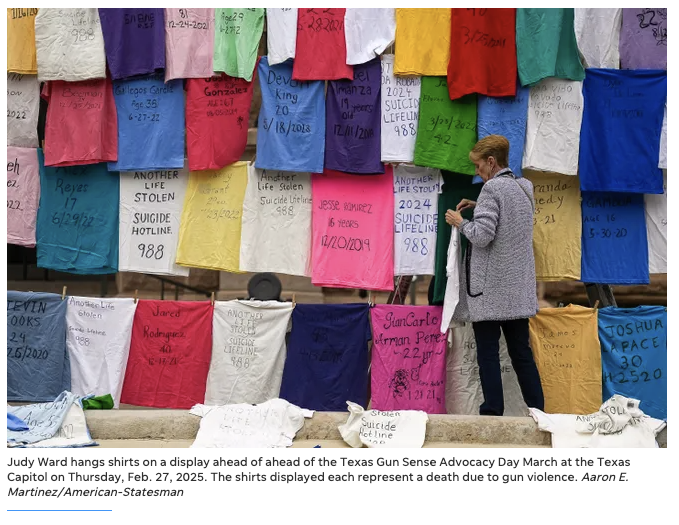A basic gun storage measure could save lives. Texas lawmakers should pass it.
By: Dr. Sue Bornstein and Nicole Golden, MSSW
Austin American-Statesman Opinion
April 18, 2025, 9:18a.m.CT

Texans take pride in courage, independence and resilience — values we pass down to our children. But to uphold these principles, we must ensure the safety of the next generation.
House Bill 2250 would close gaps in state law by strengthening safe firearm storage requirements in homes with children, to prevent unnecessary tragedies while respecting responsible gun ownership. Nearly 300 Texas youth ages 1 to 17 died by firearms in 2023, making guns the leading cause of death for children. Suicide is the second leading cause of death in young Texans ages 10 to 24. Alarmingly, youth firearm suicide in particular has increased inexorably for the last 15 years.
As physicians and advocates, we discuss risk factors with parents. Stressors like mental health conditions, harassment and bullying, family history of suicide, adverse childhood experiences, and online safety are appropriate concerns for parents, but we must also talk about access to lethal means, including firearms. According to the Texas Education Agency, in the 2023-24 school year, there were 353 incidents in which Texas students were disciplined at school for firearms violations.
Just this week, a 17 year-old shot and injured several students at Wilmer-Hutchins High School in Dallas. Even with metal detectors, clear backpacks and secure entry at the campus, this is the second shooting inside the same school in the last year.
Access to firearms is a also significant risk factor for youth suicide. Firearm suicide accounts for over one-third of youth firearm-related deaths nationwide. When public health researchers examine how firearms used in suicides are acquired, 79% of youth under 18 used the firearm of a relative, and 18% used their own firearm.
Children and teens are easily gaining access to lethal means in their home and using them with tragic outcomes. Youth in rural areas have double the suicide rate compared with peers in urban areas, and this disparity continues to grow. Why is this happening? Greater access to firearms and less accessible suicide prevention services are two contributing factors.
While the risk of youth suicide is lowest in families with no firearms at home, youth living in homes in which firearms are stored unloaded and locked are at lower risk for suicide than those in homes where firearms are stored less securely.
Safe and secure firearm storage means keeping all guns stored unloaded in a locked safe, separated from ammunition. Parents might believe their firearms are adequately hidden in locations such as dresser drawers or high shelves, or they believe their children would never use firearms in a suicide attempt. However, parents often underestimate their child’s experiences handling firearms.
Research demonstrates that among gun-owning parents who reported that their children have never handled firearms at home, 22% of the children, when questioned separately, said they actually had. We know as clinicians and parents that kids are curious. Even children who have been taught not to touch firearms are likely to handle firearms if found.
To further protect youth, the Legislature should adopt HB 528, which would provide educational materials to parents about suicide prevention and securely storing firearms and other lethal means when students are at risk.
Enacting legislation to prevent senseless tragedies while respecting responsible gun ownership means using the solutions we know work to reduce youth firearm suicides, while supporting the rights of individuals who own and store firearms securely. Let us be clear: What we are advocating for is in no way intended to remove firearms from individuals. We simply want to give parents life-saving information to safeguard their children’s lives and futures across our great state of Texas.
Dr. Sue Bornstein is the chair emerita of the Board of Regents of the American College of Physicians. Nicole Golden is the executive director of Texas Gun Sense, a gun safety organization in Texas. Dr. Katherine Hoops, director of Clinical Programs and Practice at the Johns Hopkins Center for Gun Violence Solutions, also contributed to this piece.